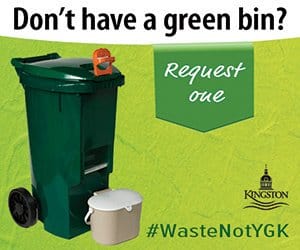The City of Kingston Requires Green Bin for Food Waste

A recent change to the City of Kingston’s Waste Bylaw means the green bin must be used for food waste.
All during the month of April, the City will be communicating the change to residents through many different channels and at the curb to offer sufficient notice of the change before the change comes into effect May 1.
As of May 1, collectors must see food waste in the bin to collect it. Throughout the month of May, waste collectors will be lenient with the new rule and provide notification for residents to get used to this change, and to encourage them to include food waste in their green bin for the following weeks’ collection.“This is about encouraging people to use the green bin for food waste and not just yard waste. The green bin is intended as a way to capture food waste and we need everyone to use it to get rid of food waste to help us reach our goal of diverting 60 per cent of household waste from landfill by 2018,” says Heather Roberts, manager of solid waste.Heather Roberts, manager of solid waste, says
Heather Roberts, manager of solid waste, says:
“This is about encouraging people to use the green bin for food waste and not just yard waste. The green bin is intended as a way to capture food waste and we need everyone to use it to get rid of food waste to help us reach our goal of diverting 60 per cent of household waste from landfill by 2018,”
SHOW US YOUR FOOD WASTE!
She says that it is okay to continue to put small amounts of yard waste in your green bin – just make sure collectors can see your food waste when they open it, either loose or in a paper or BPI-certified liner.
WHY THE CHANGE?
The City’s green bin program was introduced in 2009 with the aim of diverting food scraps from landfill. The rigorous processing required for green bin-collected organic waste costs more than twice what it costs to process the yard waste dropped off at the yard waste site at the Kingston Area Recycling Centre (KARC), or picked up during the City’s fall brush and leaf collections as it breaks down into compost more easily.
Specifically, it costs the City approximately $90 a tonne to process organic waste collected from the green bin program, but just $35 a tonne to process yard waste brought to KARC.
Permitting the use of the green bin exclusively for yard waste is an expensive way to divert grass cuttings, leaves and brush, when the fall collection is available and/or people can bring it to the Kingston Area Recycling Centre (KARC).
BRING YARD WASTE TO KARC
Residents may bring yard waste to the KARC at 196 Lappan’s Lane – but should consider grasscycling and/or using a backyard composter.
- Grasscycling means you leave mowed grass on the lawn to decompose. It releases valuable nutrients back into the soil.
- Backyard composting is the most efficient way to divert yard waste from landfill. You can buy one for $43 at KARC.
SHARE TIPS ON HOW TO LOVE YOUR GREEN BIN TO #WASTENOTYGK
The City suggests using a homemade or commercial paper or BPI-certified compostable liner to help keep food waste from sticking to your green bin.
Hint: Collect your food waste in a liner and put it in the freezer if you are concerned about smells or fruit flies.
For other tips on how to love your green bin, visit us here. Share your green bin tips at #WasteNotYGK.
About the City of Kingston
The City of Kingston provides municipal services to 125,000 residents living in this visually stunning, historic city, often ranked one of the best places to live in Canada. Kingston is focusing on being smart and livable as it pursues its vision to become Canada’s most sustainable city. We focus on environmental responsibility, social equity, economic health and cultural vitality –ensuring that today’s decisions don’t compromise our future.
Please visit The City of Kingston and join the conversation on social media:

